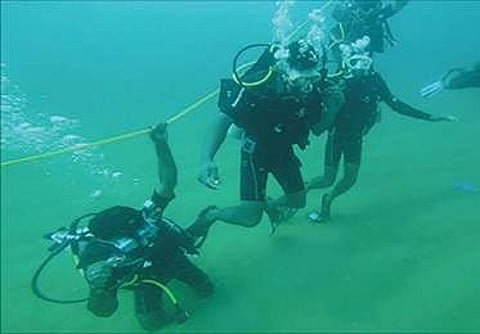

Friends of Marine Life, a community coastal voluntary organisation, helped give scuba diving training to seven of its volunteers. They urge government to give emphasis to capacity building of the youth in coastal areas
THIRUVANANTHAPURAM: The Valiyathura coast, devastated by Cyclone Ockhi a month ago, witnessed a professional attempt to support the youngsters net opportunities from the sea. As many as seven youths from the fisher community became PADI (Professional Association of Diving Instructors) certified Scuba Divers this month.
Friends of Marine Life, a community coastal voluntary organisation, helped give training to seven of its volunteers. The volunteers include five fisherfolk and two students of the Government Fisheries Technical Higher Secondary School in Valiyathura. The UN-accredited organisation funded the scuba diving training as part of its voluntary commitment to facilitate capacity building of coastal youth and indigenous fishermen.
“There are opportunities galore for people trained in scuba diving. The training provides innumerable job opportunities for the fisher community. We have a strong fisher community but they are in need of certain necessary skills. Programmes need to be structured in governmental level to facilitate capacity building of the coastal youth,” said Robert Panippilla, chief co-ordinator, Friends of Marine Life at a meet the press programme organised by FML.
The meet, which saw participation from the fisher community, underscored the fact that the sea is, in fact, pregnant with possibilities and equipping the fisher community with skills such as scuba
diving can go a long way in providing alternate job opportunities. The aftermath of Ockhi cyclone and the damage inflicted across the coastal areas brought to light the unpreparedness of the authorities in disaster mitigation. It had reiterated the need to involve fisherfolk in rescue operations. The
sentiment was echoed in the meet as well.
A Biju Kumar, professor and head of the department of Aquatic Biology and Fisheries further reiterated the need to link such training programmes in the curriculum and enumerated the myriad job opportunities available for the fishermen trained in scuba diving. “The Central government laid much emphasis on the blue growth and economy, an economy based on the ocean. It is believed the job opportunities in the marine sector will increase manifold by 2030. But we are yet to begin human resource development to supplement that requirement,” Biju said.
“It is high time the curriculum being followed in the government fisheries vocational schools is revised to include scuba diving and other such skill development programmes. Emphasis has to be given to capacity building of the youth in the coastal areas,” said Robert.
The FML has already submitted a memorandum to the government to start three schools in Vocational Fisheries Higher Secondary level which can impart such training programmes. The funding for the PADI certified training programme which costs around Rs 35,000 per person was met with the contributions made by the FML community. The second phase of the programme which begins from January will give training to ten members of the fisher community in rescue diving and Emergency First Response (EFR).
“The people from the fishermen community are more adept at handling the sea and if they are equipped with the necessary training, then they would be an added asset. They can be trained in disaster management and for those seeking higher studies, seats need to be reserved in the fisheries universities,” said Robert.
Mohammed Sadique, a Vizhinjam native who ekes out a living by collecting mussels and was a part of the diving training programme said, such training open doors to several job opportunities.
“If people like us are involved in disaster management the entire operation will be more successful since we know the sea. The government has to take steps to induct us in their disaster management task force. If people like us were included in the rescue operations during Ockhi, the enormity of the damages could have been less,” said Mohammed.
Citizen scientists
“Fishermen trained in scuba diving can be a great help in documenting marine biodiversity. The scientific community needs help to do such jobs. Foreign universities depend on citizen scientists for biodiversity documentation. The community is roped in the project. The citizens then collect marine samples for the scientists. We have to emulate it here as well. Moreover, the disaster mitigation forces should include the people from the community,” A Biju Kumar, professor and head of department of Aquatic Biology and Fisheries.
What is scuba diving
Scuba diving is a form of underwater diving where the diver uses a self-contained underwater breathing apparatus (scuba) which is completely independent of surface supply, to breathe underwater. Scuba divers carry their own source of breathing gas, usually compressed air, allowing them greater independence and freedom of movement than surface-supplied divers, and longer underwater endurance than breath-hold divers
How deep?
The depth range applicable to scuba diving depends on the application and training. The major worldwide certification agencies consider 130 feet (40 m) to be the limit for recreation diving. British and European agencies, including BSAC and SAA, recommend a maximum depth of 50 metres (160 ft). Shallower limits are recommended for divers who are youthful, inexperienced, or who have not taken training for deep dives. Technical diving extends these depth limits through changes to training, equipment, and the gas mix used. The maximum depth considered safe is controversial and varies among agencies and instructors. However, there are programmes that train divers for dives to 100 metres (330 ft)